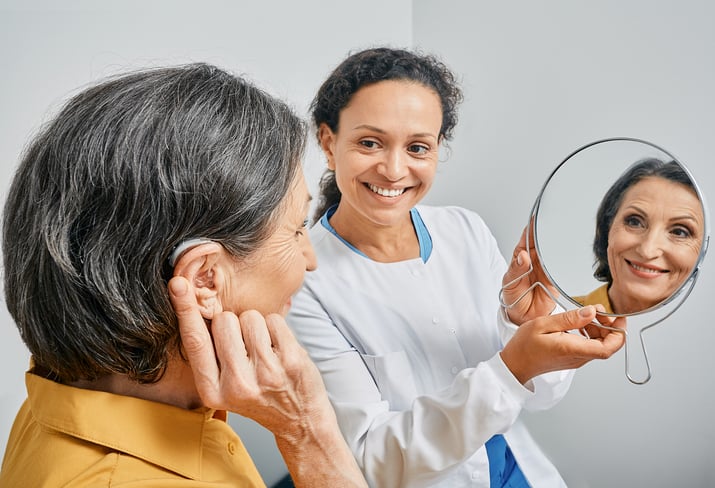Sources for the following information includes the National Institute on Deafness and Other Common Disorders and The Centers for Disease Control.
Hearing loss can occur at any age, but age is the strongest predictor.
Those in the 60-69 age group experience the greatest amount of hearing loss, but most people don’t feel any warning signs until their hearing is already damaged. Aging and/or exposure to loud noises for long periods cause tiny hair cells in the inner ear to break down, making them unable to pick up sounds as well as they once did.
Types of Hearing Loss
Hearing loss can range from mild loss–where a person misses certain high-pitched sounds, such as the voices of women and children–to a total loss of hearing.
The two general categories of hearing loss are:
- Sensorineural hearing loss happens when there’s damage to the inner ear or the auditory nerve. This type of hearing loss is usually permanent.
- Conductive hearing loss happens when sound waves cannot reach the inner ear because of earwax buildup, fluid, or a punctured eardrum. Medical treatment or surgery can usually restore this type of hearing loss.
Sudden Hearing Loss
Also known as sensorineural hearing loss or sudden deafness, this type of hearing loss of is rapid–it happens all at once or over a period of three days and is considered a medical emergency. Visit a doctor ASAP if you or someone you know experiences sudden deafness.
Age-Related Hearing Loss
Also known as presbycusis, this type of hearing loss happens gradually as a person gets older and seems to run in families. It may be caused by changes in the inner ear and auditory nerve, making it hard to tolerate loud sounds or hear what others are saying. Because it’s gradual and usually affects both ears equally, a person may be unaware they have lost some hearing ability.
Ringing in the Ears
Also known as tinnitus, and common in older people, it can sound like ringing, roaring, clicking, hissing, or buzzing, and the sounds can come and go. It might be in one or both ears, loud or soft. At least 10% of the population has experienced tinnitus in the past year and it’s sometimes the first sign of hearing loss in older adults. Tinnitus is not a disease, rather a symptom, and can be caused by a piece of earwax blocking the ear canal, a side effect of medication, or the result of several health conditions, such as high blood pressure or allergies. It can also accompany any type of hearing loss.
Signs of Hearing Loss
Some people have a hearing problem and don’t realize it. You should see your doctor and get your hearing tested if you:
- If you are around loud noises on a regular basis.
- You hear ringing in your ears.
- Have close relatives with hearing loss.
- If you have high blood pressure or diabetes.
- Have trouble hearing on the telephone and when there’s background noise.
- Find it hard to follow conversations when two or more people are talking.
- Often ask people to repeat what they’re saying.
- Listen to the TV with the volume so loud that others complain.
- Think that others seem to mumble.
- Can’t understand when women and children speak to you.
Professionals Who Can Help
Primary Care Doctor
Your family practitioner or general practitioner, geriatrician, or internist is the first line of help when it comes to your ears. They can refer you to an expert if you need it.
Otolaryngologist
Also known as an ENT, is a physician who provides medical and surgical care, diagnosis, and treatment of the ear, nose, throat, and neck. They can investigate why you’re having trouble hearing and offer specific treatment options.
Audiologist
Not a physician, but an expert with specialized training who can test your hearing and determine the type and degree of hearing loss you have. They’re licensed to t and dispense hearing aids; they can help work with you to adapt to your hearing loss and recommend hearing assistance devices that would be the most helpful for you.
Hearing Instrument Specialist
Also known as a hearing aid specialist, this state-licensed professional conducts basic hearing tests, fits and dispenses hearing aids, and can help educate you about your hearing loss.
Types of Hearing Loss Devices
Hearing Aids
These devices help make sounds louder and include many styles and types including behind-the-ear, open-fit, in-the-ear, and in-canal. Hearing aid technology has come a long way. They are now smaller, more discrete, and come with blue-tooth connectivity, among other features.
Assistive-Listening Devices
These devices help amplify sounds, provide visual cues, and/or or vibrations to make it easier to communicate and include amplified telephones, hearing aid compatible phones, smartphones, television compatible devices, alerting devices and apps.
Surgically Implanted Hearing Devices
These are electronic devices that are surgically fit inside the ear or on the head and include middle-ear implants, bone-anchored hearing aids, and cochlear implants.
If you’d like to learn more about resources in your area, you can reach out to Homethrive at (844) 343-8714 (TTY 711) for more assistance.
